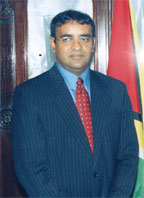-Jagdeo tells UN General Assembly
President Bharrat Jagdeo yesterday told the UN that vulnerable economies like Guyana will suffer from the crisis gripping financial markets and he assailed the EU over its proposed trade pact which this country has opposed and lobbied for climate change help.

Addressing the 63rd Session of the United Nations General Assembly in New York, Jagdeo said the troubles in the global financial markets will result in the loss of thousands of jobs worldwide and this will exacerbate the already flagging business and consumer confidence.
“Even if they are not fully integrated with the global financial system, small vulnerable economies such as Guyana will bear the full effect of these developments as demand for exports tightens, the cost of capital rises, foreign direct investment becomes scarce, and tourist arrivals and migrant remittances decline. In short, economic growth and poverty reduction efforts will suffer a severe setback and the Millennium Development Goals will become even more elusive”, he declared.
Noting the challenge posed to food security from price increases such as for oil – 148% this year alone – Jagdeo said that the international community must recognize the vital link between agricultural development and food security. And while there is a recognized comparative advantage for agriculture in relation to poverty reduction strategies, Jagdeo lamented that there had been a decline over the years in official development assistance (ODA) for the agricultural sector and rural development. He pointed out that the share of agriculture in ODA dropped from 17% in 1980 to 2.9% in 2006.
Citing the 2007 World Development Report which showed that growth generated by agriculture can be four times more effective in lowering poverty that growth from other sectors, Jagdeo argued that agriculture must be given a higher priority in national budgets as well.
“It is also urgently necessary for large developed countries to re-examine ways in which current inefficient and distortionary trade policies, particularly subsidies that support inefficient domestic production and tariffs that protect against more competitive imports, can be restructured to reduce distortions in the global marketplace”, Jagdeo contended.
The President also took the opportunity to raise the row that Guyana has with the European Commission (EC) over the signing of the controversial Economic Partnership Agreement (EPA) between the EU and CARIFORUM.
He charged that the agreement “may fundamentally affect development in our societies and jeopardize our future negotiating positions at the WTO”.
Jagdeo lamented that the “exploitation of the EU’s superior negotiating strength and the use of threats to get countries to sign are ironically how the EU hopes to start” the EPA partnership.
“Even at this late hour I wish to plead with the EU leaders to review these agreements before they irretrievably harm the good historic relations that have existed between the ACP and the EU”, he pleaded. Guyana and Haiti are the only two Caricom countries that are not prepared to sign the EPA.
Jagdeo also lobbied for recognition of the value of standing forests in the climate change battle. Pointing out that there is virtually no capital flowing to address tropical deforestation despite its 20% contribution to greenhouse gas emissions, Jagdeo said that negotiators must be set a clear direction for movement towards a post-Kyoto climate change agreement.
“Specifically, those of us who are leaders of rainforest countries need to understand that we provide services that are vital to the health of our planet, and that when we seek capital flows to compensate for this, we are not merely acting as passive poor countries looking for aid. We are providing a critical component of the climate solution, and we should be leading the design of mechanisms as we forge a post-Kyoto climate agreement”, Jagdeo posited. Jagdeo has proposed that nearly all of Guyana’s forests be deployed in the fight against climate change and the UK is intended to play a lead role in championing this cause.
The President also called for a reform of international institutions such as the World Bank and the United Nations.





